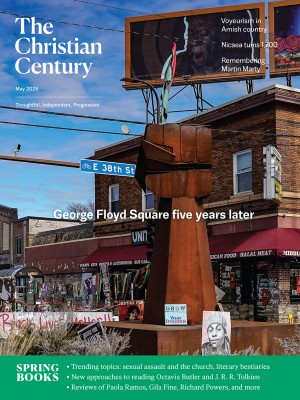May 18, Easter 5C (John 13:31–35)
Jesus’ new commandment isn’t about who we should love. It’s about how.
These days I find myself reflecting on fierce and mighty love: the kind that steps up, stands strong, and marches alongside, no matter what. A love that stares down monsters, thrusts a lantern into the deep of night, and holds on tight to the rope when life’s storms threaten to overwhelm everyone.
My spouse calls it “top-of-the-mine” love, where, if one were trapped at the bottom of a mineshaft, they could be confident—even if the operation failed—that at least one person on the rescue team had tried everything, even against the odds, to get them out safely. And they would aspire to do the same if the situation were reversed.
Read our latest issue or browse back issues.
It is not necessary to be buried alive to experience this kind of love, nor to be engaged in a rescue to offer it. Fierce and mighty love is not limited to grand and magnificent acts.
We might know it through the one who accompanies a patient to medical appointments after a terrifying diagnosis or the spouse who speaks compassion into the ears of their dying partner. We see it in the colleagues who create a meal train when the new baby comes, in the church that gathers supplies for the immigrant family that lives down the street.
Top-of-the-mine love sees things as they really are and hangs around anyway. This is love that recognizes a need and works to address it, acknowledges fear and refuses to turn away, and holds grief when the other needs space to breathe. And sometimes it puts its body on the line between the beloved and the powers that seek to destroy.
According to the Gospel of John, shortly before the cascade of events that culminate in Jesus’ own body hanging on the cross, he delivers an extended farewell to his disciples. In it he reveals the significance of what is about to happen and its implications for those who would be his followers.
“I give you a new commandment,” Jesus says, “that you love one another. Just as I have loved you, you also should love one another.”
On first hearing (or reading), one may wonder what is new about this commandment. After all, it sounds very much like a variation on the long-standing Levitical commands to love the neighbor and the stranger as yourself.
Some interpreters understand this new commandment to reflect a narrowing focus, such that disciples are called to love other disciples at the expense of those who are not followers of Jesus. Others limit the domain of love to one’s family, those who share ethnicity or political leanings, or some other way of delimiting us versus them. Thus, in these views, you shall love your neighbor, but not as much as you love the people who are most like you. Both approaches have the effect of limiting the domain of love to those who are closest or most convenient.
In contrast, Jesus’ ministry suggests a much more expansive field of love. From the prologue of John we learn that the incarnate Word—the Word made flesh—is the source of life for all things, as everything came into being through him. He is the light of the world that enlightens everyone. We have all received grace upon grace.
As John’s Gospel unfolds, Jesus embodies God’s love not only to all people broadly speaking (though surely at least that!) but also to the particular individuals who cross his path, whether or not they are believers and even if they are strangers to him. Nicodemus, the woman at the well, the man at the pool of Bethzatha: nothing suggests Jesus knew them prior to the encounters as recorded in John. Yet his compassion and healing power are offered to each one.
What is “new” about the commandment to love one another is that our love is measured against the love Jesus has for everyone rather than against our love for ourselves. “Love as I have loved you,” Jesus says. Everything else flows from that.
Thus, the primary point of Jesus’ new commandment is not the object of one’s love but the manner of loving. Not the who but the how. Jesus heals the royal official’s son without requiring the man to follow him. He heals the man at the pool of Bethzatha without demanding a confession of loyalty. He feeds the crowds on the side of the mountain without asking for proof they are hungry or whether they have food at home.
Fierce and mighty love, top-of-the-mine love, loving as Jesus loves. Call it what you will—it heals, it feeds, it fills, it brings life, it accompanies, it abides. It is who God calls us to be and what God empowers us to do.





